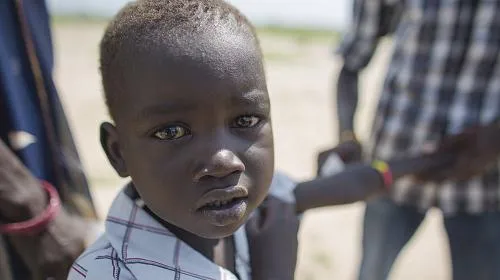Severity of crisis depends on the delivery of humanitarian assistance, particularly in conflict-affected states.
JUBA, South Sudan (Feb. 2, 2015) — As many as 2.5 million South Sudanese will be living in severe hunger in the next three months, according to figures released today by the Integrated Phase Classification (IPC), the key tool for monitoring the status of the food crisis in South Sudan.
The IPC predicts nutrition will remain critical, with as much as 80 percent of the population in some parts of the country unable to cultivate crops.
The efforts of humanitarian organizations such as CARE combined with the resilience of the South Sudanese, averted serious hunger in 2014. But with little harvest and depleted food stocks in some parts of South Sudan, the country is now more vulnerable to food crisis. Much will depend on the delivery of planned humanitarian interventions, particularly in the conflict-affected states of Jonglei and Unity.
“If communities in these states are further isolated by fighting, the results could be catastrophic,” said Aimee Ansari, CARE’s country director in South Sudan. “CARE is doing all it can to help these communities but what South Sudan desperately needs is peace.”
“We welcome the recent ceasefire, and look forward to a comprehensive settlement at the next round of peace talks later this month so people can finally start rebuilding their lives,” Ansari said. “The human suffering – the destruction, the hunger and disease – has been horrendous but it also has significant longer term impacts. The recent Cost of War report predicts the affects of hunger on labor productivity adds up to billions of lost GDP the longer the conflict lasts.”
A recent assessment of Jonglei’s Duk County carried out by CARE estimated local food stocks to last until the start of February. “People are beginning to use a variety of coping mechanisms in a bid to stave off hunger,” said Mr. Mujahid Hussain, CARE’s state coordinator for Jonglei. “They’re selling what few assets they have to buy food. In some communities people are resorting to traditional food sources – eating water lilies or wild fruits, or surviving on wild animals.
Since the outbreak of violence in December 2013, an estimated 1.5 million people have been displaced from their homes and communities, and an estimated 450,000 people have crossed into neighbouring Ethiopia, Kenya, Sudan and Uganda in search of food and to escape violence. CARE is providing emergency water, sanitation, hygiene services and education, in addition to nutrition and livelihoods assistance. CARE also supports over 40 health facilities in Unity and Upper Nile states, two of the states most heavily affected by fighting.
CARE has been operating in Southern Sudan since 1993, initially providing humanitarian relief to internally displaced people in Western Equatoria. The signing of the Comprehensive Peace Agreement in 2005 allowed CARE to expand into Jonglei and Upper Nile States to support returnees from the refugee camps, and the organization has since broadened its operations to include development programs.
About CARE:
Founded in 1945, CARE is a leading humanitarian organization fighting global poverty. CARE has more than six decades of experience helping people prepare for disasters, providing lifesaving assistance when a crisis hits, and helping communities recover after the emergency has passed. CARE places special focus on women and children, who are often disproportionately affected by disasters. To learn more, visit www.care.org.
Media Contacts:
Nicole Harris, nharris@care.org, 404-735-0871
Brian Feagans, bfeagans@care.org, 404-979-9453

